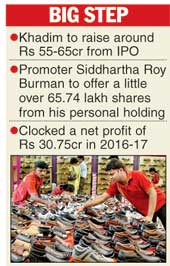
Calcutta, July 19: The JSW group could join the race to acquire Essar Steel Ltd - if and when the Ruias-owned steel giant is put up for sale as part of the insolvency and bankruptcy proceedings initiated by lenders led by the State Bank of India before the National Company Law Tribunal.
The Jindals have two other troubled steel makers - Bhushan Steel and Monnet Ispat - within their sights. Both are among the 12 entities that have been cherry-picked by the Reserve Bank of India as part of a process under the bankruptcy code approved by Parliament last year to resolve the crisis within the banking industry, which has been swamped by a mountain of bad loans.
Parth Jindal, scion of the $11-billion conglomerate that has interests in steel, power, cement and infrastructure, said even Essar would be attractive at a right price.
He, however, clarified that the group's balance sheet would allow only one big-ticket acquisition and it would have to be a toss-up between Essar and Bhushan.
"We can take up only one of the two (Essar Steel and Bhushan Steel), over and above Monnet. Our preference is Bhushan (over Essar) because of geography," Jindal said today.
Parth Jindal, who heads the cement business, does not sit on the board of JSW Steel, managed by his father Sajjan Jindal who is the chairman of the group and the company.
"We are keen on Bhushan Steel and Monnet Ispat," said the younger Jindal who looks after the US operations of JSW Steel.
Lenders to Monnet have turned down the initial proposal of JSW, which is revising the offer.
Under a directive from the Reserve Bank of India to resolve the mess around stressed assets in the Indian banking system, banks and financial institutions have initiated bankruptcy proceedings against the 12 large highly-indebted firms of which five belong to the steel sector.
Apart from Bhushan, Essar and Monnet, the priority list includes Electrosteel Steels and Bhushan Steel & Power Ltd.
Bhushan Steel has debts of around Rs 44,000 crore on its books compared with Essar Steel's Rs 37,000 crore. In contrast, Monnet has a much smaller debt pile of around Rs 9,000 crore.
The induction of a new promoter will be a legally fraught lengthy process and will crucially hinge on the lenders readiness to accept a "hair-cut" on their loans - which is usually measured by the difference between the market value of assets given as loan collateral and the actual amount of the loan. In a default-like situation, the lender sells the asset to recover only a part of the loan.
The challenge before the Indian banking and legal systems to quick fix the bad asset mess was laid bare earlier this month when the Ruias-owned Essar Steel questioned the RBI directive before the Gujarat high court, which eventually quashed the petition.
JSW, the largest steel maker in India with an installed capacity of 18 million tones, has traditionally demonstrated a risk-taking appetite, acquiring Ispat and Siscol in the past.
US operations
Buoyed by the focus on manufacturing by the Donald Trump-presidency in the United States, the JSW group is proposing to invest $350 million afresh to turn around the loss-making plate and pipe mill in Texas.
"We will put up an electric arc furnace and slab caster as a backward integration for the mills if environment clearance is received. This will bring down the production cost by $150 per tonne and make our product as competitive as Nucor or ArcelorMittal," Parth Jindal said.
The business was bought for $1 billion in 2008 from Prithviraj Jindal, elder brother of Sajjan Jindal. The US mills made a profit only for six months before plunging into losses.
JSW Steel tried to sell the business or bring in a new partner in 2011 and again in 2016, but the offers were found to be inadequate.
However, the outlook for the US facility has changed since the advent of Trump. JSW is not willing to exit the operations any more. The business has started making profits at the operational level.










